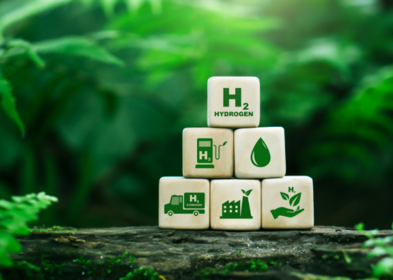
18/07/2024
Hydrogen: A New Resource for the Energy Transition?
Enrica Lazzarini
Hydrogen vehicles are emerging as a sustainable and alternative solution to electric vehicles.
Hydrogen is gaining increasing attention as one of the fuels of the future for vehicles, due to its sustainability and efficiency advantages. Hydrogen fuel cell vehicles (Fuel Cell Electric Vehicle - FCEV) use hydrogen to produce electricity, with water as the only emission, making it one of the most eco-friendly options available on the market.
One of the major advantages of hydrogen vehicles is their rapid refueling: unlike battery electric vehicles, which can take hours for a full charge, FCEVs can be refueled in just a few minutes. This makes them particularly suitable for applications where downtime must be minimized, such as commercial transportation and public services.
One of the major advantages of hydrogen vehicles is their rapid refueling: unlike battery electric vehicles, which can take hours for a full charge, FCEVs can be refueled in just a few minutes. This makes them particularly suitable for applications where downtime must be minimized, such as commercial transportation and public services.
Is All Hydrogen the Same?
In northeastern France, a deposit has been discovered that could contain up to 46 million tons of white hydrogen, produced by natural geological mechanisms. If estimates are accurate, this would be the largest deposit in the world. Geologists made this discovery accidentally while evaluating the potential of a methane deposit. But how does this differ from gray hydrogen, obtained from fossil fuels?
The hydrogen found in the French deposit is known as "white hydrogen," which is geological and free, meaning it is not bonded to other chemical elements. White hydrogen should not be confused with gray hydrogen, which is obtained from fossil fuels (primarily methane). Gray hydrogen constitutes 90% of all hydrogen produced worldwide and is used for oil refining, producing fertilizers and fuels (synthetic methane, methanol, ammonia), and powering electric vehicles. However, the process of deriving gray hydrogen releases significant amounts of CO2 into the atmosphere.
There is also green hydrogen, produced via water electrolysis using only electricity from renewable sources like wind and solar. This technology is seen as a key solution for decarbonizing sectors that are difficult to electrify directly, such as heavy industry and transport.
According to a recent Deloitte report ("Emerging green hydrogen market set to help reshape global energy map by end of decade, creating US$1.4 trillion market by 2050"), the global green hydrogen market could reach a value of $1.4 trillion by 2050, significantly contributing to CO2 emissions reductions. This development is supported by increased attention from governments and private investors, who are launching numerous initiatives in Europe, Asia, and Australia.
Currently, the production of green hydrogen is more expensive than that of gray hydrogen, but costs are rapidly decreasing due to advances in related technologies and reductions in renewable energy costs.
Various industries are already engaged in pilot projects to integrate green hydrogen into their operations. The transport sector is one of the first to adopt these technologies, showing particular interest in using hydrogen to power heavy vehicles, trains, and ships. These modes of transport require the energy density and rapid refueling offered by hydrogen, features not easily achievable with current electric batteries.
The hydrogen found in the French deposit is known as "white hydrogen," which is geological and free, meaning it is not bonded to other chemical elements. White hydrogen should not be confused with gray hydrogen, which is obtained from fossil fuels (primarily methane). Gray hydrogen constitutes 90% of all hydrogen produced worldwide and is used for oil refining, producing fertilizers and fuels (synthetic methane, methanol, ammonia), and powering electric vehicles. However, the process of deriving gray hydrogen releases significant amounts of CO2 into the atmosphere.
There is also green hydrogen, produced via water electrolysis using only electricity from renewable sources like wind and solar. This technology is seen as a key solution for decarbonizing sectors that are difficult to electrify directly, such as heavy industry and transport.
According to a recent Deloitte report ("Emerging green hydrogen market set to help reshape global energy map by end of decade, creating US$1.4 trillion market by 2050"), the global green hydrogen market could reach a value of $1.4 trillion by 2050, significantly contributing to CO2 emissions reductions. This development is supported by increased attention from governments and private investors, who are launching numerous initiatives in Europe, Asia, and Australia.
Currently, the production of green hydrogen is more expensive than that of gray hydrogen, but costs are rapidly decreasing due to advances in related technologies and reductions in renewable energy costs.
Various industries are already engaged in pilot projects to integrate green hydrogen into their operations. The transport sector is one of the first to adopt these technologies, showing particular interest in using hydrogen to power heavy vehicles, trains, and ships. These modes of transport require the energy density and rapid refueling offered by hydrogen, features not easily achievable with current electric batteries.
Hydrogen-Related Infrastructure
Despite the numerous advantages, the spread of hydrogen vehicles is still hindered. Producing and distributing hydrogen requires dedicated infrastructure, which is currently struggling to become available, although the trend is changing.
Changes in Maintenance Practices
Compared to internal combustion engine vehicles, hydrogen vehicles require less traditional mechanical maintenance, such as oil changes and engine maintenance. However, they require special attention to the specific components of the fuel cells and hydrogen tanks. For instance, managing fuel cells involves continuous monitoring of hydrogen purity and periodic checks of the electrolytic membranes. A study published in the International Journal of Hydrogen Energy highlighted that fuel cell lifespan can be significantly influenced by the quality of maintenance (IJHE, 2021).
Moreover, safety in managing high-pressure hydrogen tanks is crucial. Workshop operators must be trained to handle highly flammable materials safely, following strict protocols to prevent accidents. Fuel cell technology brings with it a new set of safety standards and regulations that must be adhered to.
Moreover, safety in managing high-pressure hydrogen tanks is crucial. Workshop operators must be trained to handle highly flammable materials safely, following strict protocols to prevent accidents. Fuel cell technology brings with it a new set of safety standards and regulations that must be adhered to.






